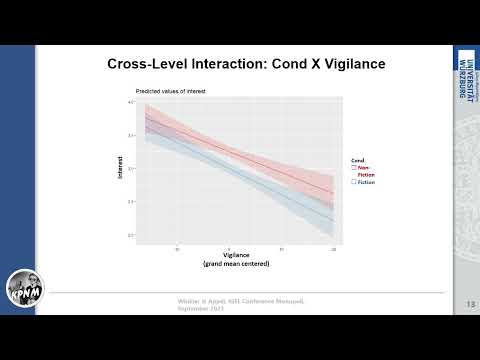 Speaker: Julia Winkler @jwinkler (designated presenter) and Markus Appel
Speaker: Julia Winkler @jwinkler (designated presenter) and Markus Appel
 Affiliation: Psychology of Communication and New Media, University of Würzburg, Germany
Affiliation: Psychology of Communication and New Media, University of Würzburg, Germany
Title: Approaching climate change through fiction: Do cognitively avoidant individuals prefer Climate Fiction over non-fictional climate narratives?
Abstract (long version below): Empirical ecocriticism is an emerging field that combines insights from the environmental humanities with methods from environmental communication and the empirical study of literature in order to study the impact of environmental narratives in literature, film, television, video games, and other media on attitudes, emotions, perceptions, and behavior (Małecki, 2019; Schneider-Mayerson, Weik von Mossner, et al., 2020). While still relatively new, the field has already generated significant interest in academia and beyond, with special journal issues and edited collections devoted to it (Schneider-Mayerson et al., 2023), as well as media coverage by the likes of Newsweek or Psychology Today. This interest is mainly due to the exciting output generated by empirical ecocriticism on the potential of stories to move the public on today’s most pressing environmental issues such as animal welfare, species extinction, and climate change (Brereton & Gómez, 2020; Iossifidis & Garforth, 2022; Małecki et al., 2016, 2019; Malecki et al., 2021; Myren-Svelstad, 2023; Sabherwal & Shreedhar, 2022; Schneider-Mayerson, 2018; Schneider-Mayerson, Gustafson, et al., 2020). The symposium focuses on the latter topic, providing new experimental data from studies conducted with Indian, German, and US participants, on the impact of climate narratives, both fictional and factual, on personal norms, emotions, and behavioral intentions.

 Long abstract
Long abstract
Fictional narratives offer a compelling form of learning about the real world and provide an approach to issues that might otherwise be experienced as threatening or emotionally overly arousing. The simulations afforded by fictional narratives (Mar & Oatley, 2008) allow to explore emotionally extreme scenarios at an aesthetic distance and in a safe and controlled manner (Cupchik, 2002; Mar et al., 2011).
Climate change threatens the lives of many people and poses great uncertainty for the future of humankind (IPCC, 2022). If emotional arousal is perceived as non-manageable, cognitive avoidant coping is likely to be activated. Cognitive avoidance (i.e., turning attention away) and vigilance (i.e., increased attention towards) describe two coping modes in response to stressors and individuals differ in their dispositional coping modes in response to threats (Krohne & Hock, 2011).
Climate change is not only a topic of non-fictional media discourse: Climate Fiction (Cli-Fi) has emerged as a genre of narrative fiction that portrays life in a world changed by anthropogenic global warming (Andersen, 2020). We propose that particularly for individuals with a high disposition for cognitive avoidance, fictional climate change narratives might present an approach to climate change issues that is less emotionally overwhelming and might thus be preferred over non-fictional climate change narratives. We will present the results of an experiment in which we investigate the role of dispositional coping modes in a media choice scenario. Participants are presented with a set of various narrative synopses dealing with issues around climate change or another topic that is less likely to be perceived as threatening (e.g., historic narratives). Stories are labelled as either fictional or non-fictional. Implications for the role of fiction to convey potentially threatening real-life issues will be discussed.
References
Andersen, G. (2020). Climate fiction and cultural analysis: A new perspective on life in the anthropocene. Routledge. https://doi.org/10.4324/9780429342493
Cupchik, G. C. (2002). The evolution of psychical distance as an aesthetic concept. 8(2), 155–187.
IPCC (2022). Climate change 2022: Impacts, adaptation and vulnerability. Contribution of working group II to the sixth assessment report of the
Intergovernmental Panel on Climate Change. Cambridge University Press. https://doi.org/10.1017/9781009325844.
Krohne, H. W., & Hock, M. (2011). Anxiety, coping strategies, and the processing of threatening information: Investigations with cognitive-experimental paradigms. Personality and Individual Differences, 50(7), 916–925. Redirecting
Mar, R. A., & Oatley, K. (2008). The function of fiction is the abstraction and simulation of social experience. Perspectives on Psychological Science, 3(3), 173–192. https://doi.org/10.1111/j.1745-6924.2008.00073.x
Mar, R. A., Oatley, K., Djikic, M., & Mullin, J. (2011). Emotion and narrative fiction: Interactive influences before, during, and after reading. Cognition & Emotion, 25(5), 818–833. https://doi.org/10.1080/02699931.2010.515151

